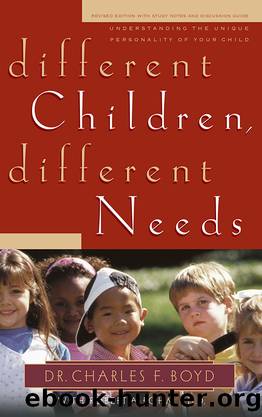Different Children, Different Needs by Dr. Charles F. Boyd

Author:Dr. Charles F. Boyd [Boyd, Dr. F. Charles]
Language: eng
Format: epub
ISBN: 978-0-307-56874-8
Publisher: The Crown Publishing Group
Published: 2012-06-06T00:00:00+00:00
ADJUSTING YOUR PARENTING STYLE
The very thought of adapting your parenting style to different children may seem impossible. After all, isnât it your ânaturalâ style? Itâs important to realize that I do not mean becoming a different person. You cannot change your basic, God-given nature. But you can voluntarily and temporarily adjust your behavior in order to meet other peopleâs needs, to build a mutually satisfying relationship.
Many people simply need to understand another personâs behavioral style. Then, if they find they need to make adjustments, they manage to do it.
Other people may be able to make the adjustments but are not willing to do so. Perhaps they are too selfish to make the necessary commitment to develop a mature relationship. Perhaps theyâre lazy. Either way, the relationship moves toward isolation and a feeling of emotional distance.
Still others are willing to make adjustments, but are not able to. It may be that something in their background is preventing them from expressing the kind of love another family member needs. Or they may lack emotional maturity or training in social skills. These people may need extra help, or even counseling.
But if you are reading this book, you probably are willing to give it a try. If thatâs the case, I have some suggestions for how to adjust your parenting style:
1. Recognize how your personal perceptions confuse, color, or cloud critical people issues. Most problems in human relations stem from a difference in perceptionâtwo or more people viewing the same situation in different ways.
Your perceptions about your children will be influenced by your needs and values, your self-concept, past experiences, prejudices, likes, and dislikes. And, yes, it will be influenced by your behavioral style. In some cases these personal perceptions can be helpful. If you believe what the Bible says about the natural selfishness of human beings, this value will influence how you approach your two young children when they are fighting over which television show to watch, and each gives a different story about whose turn it is to choose.
These perceptions can also hinder you. In some cases, your behavioral style will prevent you from understanding the true nature of a conflict. Your perceptions can prevent you from responding properly to different situations. They influence your expectations of what you want from your children and from others. Mostly, they prevent you from understanding why others behave as they do.
Billâs natural Directive style, which serves him so well as chief executive officer in a West Coast Fortune 500 company, doesnât work so well with his ten-year-old son, Kirk. A high âI,â Kirk thrives on people interaction, rather than on completing tasks.
At home, Bill has come up with a list of daily chores for Kirk to complete. He directs Kirk like he directs people at the office. Bill wants to tell Kirk what to do, and then he expects Kirk to finish the job on his own. After all, thatâs how Bill operates. He likes it when his own boss tells him what to do and then gets out of the way.
Download
This site does not store any files on its server. We only index and link to content provided by other sites. Please contact the content providers to delete copyright contents if any and email us, we'll remove relevant links or contents immediately.
The 5 Love Languages: The Secret to Love That Lasts by Gary Chapman(9768)
The Space Between by Michelle L. Teichman(6921)
Assassin’s Fate by Robin Hobb(6191)
Wiseguy by Nicholas Pileggi(5757)
Everything Happens for a Reason by Kate Bowler(4729)
Gerald's Game by Stephen King(4631)
Pillow Thoughts by Courtney Peppernell(4266)
A Simplified Life by Emily Ley(4154)
The Power of Positive Thinking by Norman Vincent Peale(4050)
Harry Potter and the Prisoner of Azkaban (Book 3) by J. K. Rowling(3345)
Resisting Happiness by Matthew Kelly(3332)
Girl, Wash Your Face by Rachel Hollis(3273)
Being Aware of Being Aware by Rupert Spira(3264)
The Code Book by Simon Singh(3167)
The Secret Power of Speaking God's Word by Joyce Meyer(3152)
More Language of Letting Go: 366 New Daily Meditations by Melody Beattie(3017)
Real Sex by Lauren F. Winner(3001)
Name Book, The: Over 10,000 Names--Their Meanings, Origins, and Spiritual Significance by Astoria Dorothy(2967)
The Holy Spirit by Billy Graham(2938)
